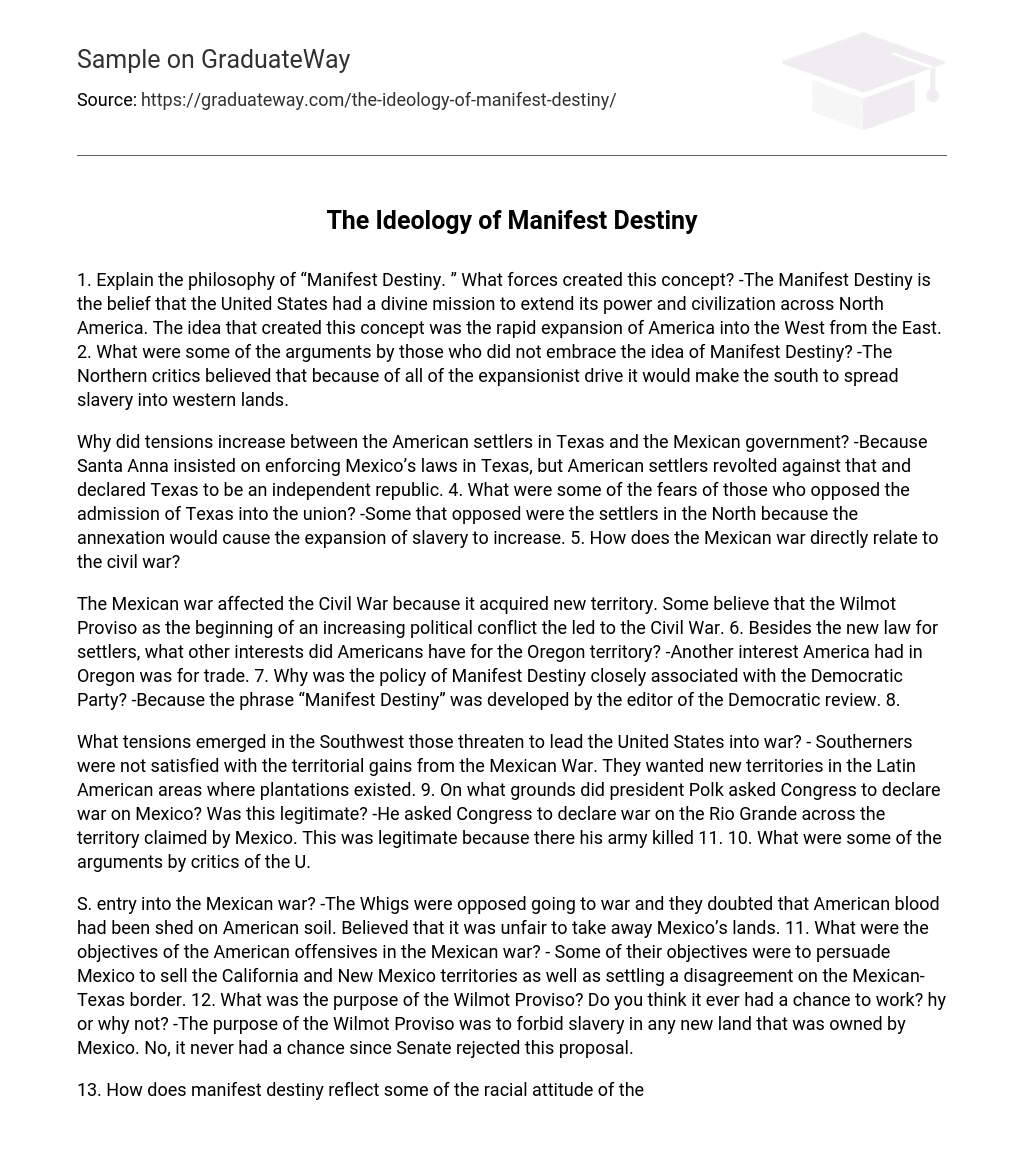1. Explain the philosophy of “Manifest Destiny. ” What forces created this concept? -The Manifest Destiny is the belief that the United States had a divine mission to extend its power and civilization across North America. The idea that created this concept was the rapid expansion of America into the West from the East. 2. What were some of the arguments by those who did not embrace the idea of Manifest Destiny? -The Northern critics believed that because of all of the expansionist drive it would make the south to spread slavery into western lands.
Why did tensions increase between the American settlers in Texas and the Mexican government? -Because Santa Anna insisted on enforcing Mexico’s laws in Texas, but American settlers revolted against that and declared Texas to be an independent republic. 4. What were some of the fears of those who opposed the admission of Texas into the union? -Some that opposed were the settlers in the North because the annexation would cause the expansion of slavery to increase. 5. How does the Mexican war directly relate to the civil war?
The Mexican war affected the Civil War because it acquired new territory. Some believe that the Wilmot Proviso as the beginning of an increasing political conflict the led to the Civil War. 6. Besides the new law for settlers, what other interests did Americans have for the Oregon territory? -Another interest America had in Oregon was for trade. 7. Why was the policy of Manifest Destiny closely associated with the Democratic Party? -Because the phrase “Manifest Destiny” was developed by the editor of the Democratic review. 8.
What tensions emerged in the Southwest those threaten to lead the United States into war? – Southerners were not satisfied with the territorial gains from the Mexican War. They wanted new territories in the Latin American areas where plantations existed. 9. On what grounds did president Polk asked Congress to declare war on Mexico? Was this legitimate? -He asked Congress to declare war on the Rio Grande across the territory claimed by Mexico. This was legitimate because there his army killed 11. 10. What were some of the arguments by critics of the U.
S. entry into the Mexican war? -The Whigs were opposed going to war and they doubted that American blood had been shed on American soil. Believed that it was unfair to take away Mexico’s lands. 11. What were the objectives of the American offensives in the Mexican war? – Some of their objectives were to persuade Mexico to sell the California and New Mexico territories as well as settling a disagreement on the Mexican-Texas border. 12. What was the purpose of the Wilmot Proviso? Do you think it ever had a chance to work? hy or why not? -The purpose of the Wilmot Proviso was to forbid slavery in any new land that was owned by Mexico. No, it never had a chance since Senate rejected this proposal.
13. How does manifest destiny reflect some of the racial attitude of the times? – Manifest Destiny reflects some of the racial attitudes because white settlers had the ability and right to invade the Native Americans land. 14. Why do you think the U. S. was not successful at expanding into central and South America as they were moving westward? The U. S. was not successful at expanding into central and South America as they moved westward because William Walker developed a proslavery in Central America, but the counties there invaded and defeated him and his scheme. 15. How does the artwork of the time reflect the values of the culture? – The artwork reflects on the large group of pioneers. There are mostly pictures of them, but during this time they had overland trails.
16. What are some traits that are seen in all the artwork? Why might this be? Some traits are that mostly the people in the drawings are white not any other color. Most of the time we can see them carrying guns, or being in large groups. 17. Why would the railroad have such a long lasting impact on the development of the country? How would it shape where cities were formed? -The railroads had such a long lasting impact on the development of the country because they united the common commercial interests of the Northeast and the Midwest. It also gave the North strategic advantages in the Civil War.





